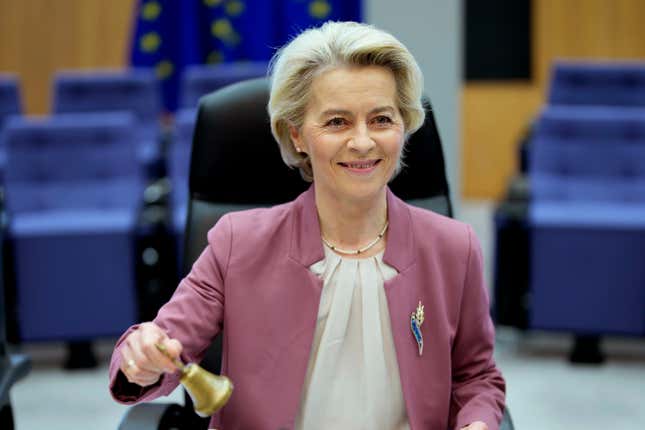
BEIJING (AP) — The leaders of China and the European Union held talks Thursday that focused on their disputes over trade, subsidies and a deep divide over the war in Ukraine.
Chinese President Xi Jinping met in Beijing with the two European presidents, Ursula von der Leyen from the EU Commission and Charles Michel from the EU Council.
The European Union is calling on China to improve market access to address an annual trade imbalance of more than $200 billion between the two sides.
China is unhappy with an EU investigation into subsides for electric vehicles and possible EU restrictions on technology exports. The EU has urged China to use its influence with Russia to help bring an end to the Ukraine conflict.
Von der Leyen said the two sides need to manage their differences responsibly.
“China is the EU’s most important trading partner,” she said in opening remarks posted on the commission's website. “But there are clear imbalances and differences that we must address.”
Xi said that China and the EU should handle their differences through dialogue, and pushed back against what his government sees as a shift in Europe toward a more strident and competitive approach to China.
“We should not view each other as rivals just because our systems are different, reduce cooperation because competition exists, or engage in confrontation because there are disagreements,” he said, according to China's Foreign Ministry.
The meeting comes a day after EU member Italy reportedly announced it was withdrawing from Xi's signature “Belt and Road" initiative that aims to build a global network of Chinese-financed roads, ports and power plants.
Italy became the first G7 country to sign on to the initiative in 2019, when the government at the time promoted it as a way of increasing trade with China while getting investments in major infrastructure projects.
Neither outcome materialized. In the intervening years, Italy’s trade deficit with China has ballooned from 20 billion euros to 48 billion euros ($21.5 billion to $51.8 billion.)
Wang Lutong, the director general of the Foreign Ministry’s European Department, defended the initiative, noting that nearly 150 countries had joined and that the World Bank had credited it with reducing poverty.
“I don’t think the drop out of one or two countries could possibly obscure the bright future of this initiative,” he said at a media briefing following Thursday's talks. “We’re proud of this initiative and we’ll continue this partnership with the rest of the world.”
After nearly three years of self-imposed isolation during the COVID-19 pandemic that took a heavy toll on its economy, and having adopted an assertive foreign policy that seeks to challenge the U.S.-led world order, China now appears to be taking a slightly more moderate tone.
Xi held four hours of talks with U.S. President Joe Biden last month in California in their first face-to-face meeting in a year, with the leaders vowing to stabilize their fraught relationship.
Von der Leyen and Michel, the president of the EU Council, met Xi in the morning and later held talks with China's No. 2 leader, Premier Li Qiang. von der Leyen, as commission president, heads the day-to-day business of the EU, while Michel chairs the summits of EU leaders.
Von der Leyen said the two sides had an “intense discussion on the topic of trade imbalance and the root causes," citing in part a slowdown in the Chinese economy, which is reducing domestic demand and prompting companies to divert their products to the European market.
The European Union is calling on China to improve market access for products from its 27 member countries to address the massive trade imbalance. China exported $458.5 billion worth of goods to the EU in the first 11 months of this year and imported $257.8 billion, according to Chinese customs data released Thursday.
“We agreed that we have now a list of different elements where we want to deep dive together in the high-level dialogue. This is important, first of all on our side to show the evidence but secondly then also to seek concrete results on the ground,” she said.
The EU is looking for better market access for a range of products including cosmetics, infant formula, medical devices, wine and other alcoholic beverages.
The EU has angered China by launching an investigation into the latter’s subsidies for electric vehicles to determine whether they give manufacturers in China an unfair competitive advantage in European markets.
Wang also took aim at possible EU restrictions on technology exports to China. “We are very keen to import more products from Europe, particularly the high-advanced technologies and the high-valued products, and we hope that Brussels will not put any barriers to the trade between us,” he said.
China has angered the EU by taking a neutral stance in what most European countries see as a Russian war of aggression against Ukraine. The EU is calling on China to ensure that its exports are not aiding Russia’s war effort and that companies operating in China are not undermining sanctions against Russia.
“Russia’s war of aggression is a blatant violation of international law and the U.N. Charter, and it is a serious threat to European security,” von der Leyen said. “And this is why we recalled the need for China to use all its influence on Russia to stop this war of aggression and to engage in Ukraine’s peace formula."
The Foreign Ministry's Wang repeated China's call for an immediate cease-fire in Ukraine and the opening of talks between Western leaders and Russian President Vladimir Putin on European security and strategic stability.
“Sometimes European politicians say to us that China needs to speak to Russia, you need to speak to President Putin about withdrawing their soldiers,” he said. “This is a very independent, sovereign nation. President Putin is making his decision based on his own national interest and security.”
___
Associated Press writer Christopher Bodeen in Taipei, Taiwan, contributed to this report.